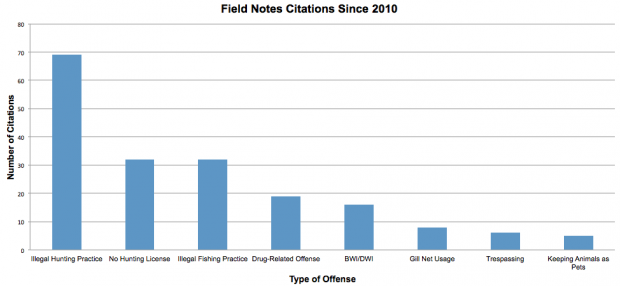No, You Can’t Keep a Pet Deer in Texas

Photo by flickr user focus-ur-life
Texas game wardens prevent deer like this one from being hunted illegally.
And Other Observations from Game Warden Field Notes
With each new edition of Game Warden Field Notes, a semi-regular release from the Texas Parks and Wildlife Department, we get a small peek into the day-to-day experience of Texas’ game wardens.
Usually these include exactly what you might expect: hunters shooting game from their vehicles, anglers exceeding catch limits, and so on. But the field notes are also worth reading because of the occasional unexpected gems like these:
- In San Patricio County, a game warden received a call about someone keeping a family of deer as pets. When the warden arrived at the scene, the homeowner claimed that “he knew this day would come,” before leading the warden to the pen where he kept the deer. The deer were relocated to a more suitable habitat.
- A Henderson County man accidentally shot a deer out of season in October of 2010. Even though he was only 50 yards away, he claimed to have mistaken the deer for a dog.
- On Sept. 4, 2011 in Harris County, two game wardens were contacted by a distressed waterfront restaurant owner. Apparently, a 76-foot catamaran had run into his restaurant’s dock. The dock was dislodged from the establishment, causing some of his property to fall in the water. When the wardens caught up to the catamaran, the boat’s operator was unable to explain why he had hit the dock. To the surprise of no one, he was arrested for boating while intoxicated.
StateImpact Texas categorized every Game Warden Field Notes entry dating back to 2010 in order to illustrate the most common offenses that wardens encounter.
The results aren’t too surprising. Game wardens cited people most often for illegal hunting practices like shooting game out of season or improperly discarding a carcass. The second-most common offense was hunting without a license.
But beyond those two major categories, there’s a wide range of offenses that game wardens regularly encounter. Illegal fishing is fairly common, as are citations for Boating/Driving While Intoxicated. Wardens also make drug arrests and seizures with regularity, with a fairly even split between busting personal users and big-time smugglers.
According to TPWD spokesperson Mike Cox, the field notes are an accurate representation of the game wardens’ day-to-day experiences. Despite the prevalence of some citations over others, he says that the wardens don’t necessarily stress one law over another.
“[Game wardens] enforce any conservation law violation that they run across,” he said. “Some of the violations tend to be cyclical…so that extent I think that that’s why you see some clumping when you look at those notes over a period of years.”
Though the game wardens are clearly keeping busy, it’s difficult to know how much conservation-related crime never comes to justice.
Between 2011 and 2013, the TPWD’s budget for law enforcement dropped by over $2 million. Although its funding as a percentage of the budget increased by 1.9% over that same period, a significant cut in the agency’s overall funding resulted in the game wardens taking a hit.
This budget cut forced the TPWD to layoff 111 people. The agency did not specify what departments those layoffs came from.
Even with a tightened budget, Cox can’t say for certain whether the department is letting anything slip.
“I certainly have no impression one way or the other that a lot of stuff is missed. Of course we do – like any law enforcement agency, we depend heavily on voluntary compliance. The good news is that the vast majority of Texas hunters comply with the laws,” he said.

